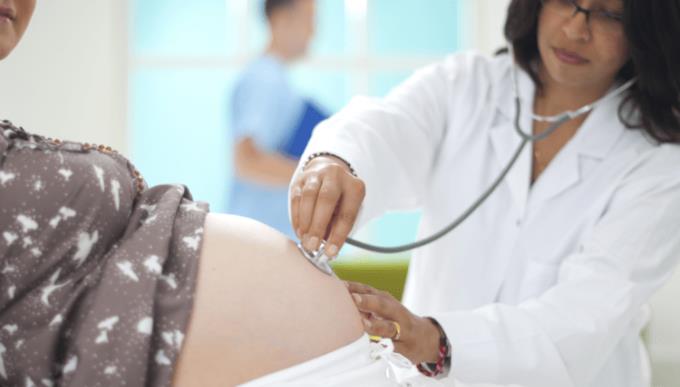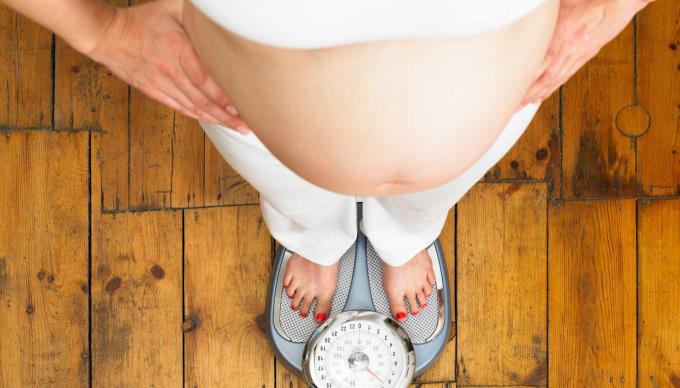Reference: Calculate your due date quickly and accurately
The reality is that it is difficult to determine exactly when you will go into labor so you can prepare everything for the labor. But do not worry too much, in the late stages of pregnancy will appear signs of about to give birth to tell you that your baby is ready to be born.
Please refer to the 10 signs of impending birth below to prepare the best things to welcome the little angel born!
10 signs of about to give birth pregnant mothers can easily identify
1. Falling belly, falling belly
In the late stages of pregnancy, the fetus will gradually move into the pelvic area to prepare for labor. This can happen a few weeks or hours before your actual labor. If this isn't your first birth, this sign of labor may be overlooked if you don't often pay attention to the shape or position of your abdomen.
When these signs appear, you may feel better breathing as the fetus is no longer compressing the lungs. However, falling down your pelvis puts pressure on your cervix and on your bladder, making you want to urinate more .
2. Labor contractions

Uterine contractions sometimes still show up during pregnancy. But these contractions are irregular and appear sparse. This is called the Braxton Hicks physiological contraction or false sign of delivery.
Meanwhile, the contractions of labor are really strong, the pain makes you uncomfortable and does not decrease even if you change positions. The frequency of muscle contraction is more continuous and regular, about 5-7 minutes will have a contraction lasting from 30 seconds to 1 minute. Therefore, it will not be too difficult for you to distinguish between physiological spasms from labor contractions .
The frequency of constant, strong uterine contractions can make you shiver even if you don't feel cold. This may happen during or after birth, but don't worry. Shivering is the body's natural way of reducing stress. To reduce this, you can take a warm bath or have a husband massage.
3. Changing cervical mucus is a recognizable sign of labor
The mucus that accumulates in the cervix during pregnancy gradually forms the cervical mucus node. Around 37-40 weeks of pregnancy, you will notice that your vagina is producing more fluid, more viscous. This is the phenomenon of losing cervical mucus when the mucus plug works to seal the cervix to prevent inflammation from peeling off to "pave the way" for babies to be born.
The mucus can be clear, dark or pink or with a little blood. This is a sign that your baby will be born in a few days. But there are many pregnant women who have to wait 1 to 2 weeks before they actually go into labor. If the pregnancy is full term and you want to see your baby but still have no signs of labor, you can consult with your doctor to apply methods to stimulate labor .
Note that if your mucus contains a lot of blood (like when you have a period), this could be a sign of dangerous labor, you should go to the hospital right away.
4. Dilated cervix is an imminent symptom

The cervix will begin to open, dilate, and thin in the days or weeks before you go into labor in order to "clear the path" for your baby to be born. When you go for regular pregnancy check-ups, your doctor can measure and monitor the dilation and thinning of the cervix through vaginal exams. On average, the cervix has to open 10cm to be considered a sign of going to be born.
5. Diarrhea
Changes in diet, hormones, medication use ... can cause you to experience diarrhea during pregnancy . However, when your due date is approaching , diarrhea can be a sign that you should be prepared to welcome your baby.
Preterm diarrhea is caused by hormones made to facilitate the birth of the baby that can stimulate your bowels to work more often, causing you to experience diarrhea or vomiting. This often makes you tired from dehydration, but do not worry too much because this is a natural response of the body. During labor, you may also want to go to the bathroom.
The best way to deal with this problem is to drink plenty of fluids to prevent dehydration. If the diarrhea is too severe, you should see your doctor for appropriate medical advice.
6. Lose weight or stop gaining weight

By the end of pregnancy, your weight usually stabilizes or may even lose weight. This is normal, you do not need to worry as it will not affect the weight of the fetus . The cause of this phenomenon may be due to reduced amniotic fluid and prepares the baby for birth.
7. Feeling tired and want to sleep more
The stomach is getting bigger and bigger, causing bladder pressure, making you need to urinate often at night, making it difficult to sleep in peace every night. Therefore, if you feel sleepy at any time, you should take advantage of healthy naps to stay healthy for the important upcoming period.
On the contrary, at this stage, many mothers suddenly become unusually active, agile and prefer to clean the house and prepare for delivery . This can also be seen as a sign of coming when your motherhood instincts kick in and you want to be best prepared to greet your baby.
8. Get more back cramps and pain

When you are about to give birth, you may feel the cramps appear more often. At the same time, pain in the back or groin will get worse. Especially if this is your first pregnancy, these signs may be more pronounced. The cause of this condition is that the muscles in the pelvis and uterus in late pregnancy are stretched to prepare for the birth of the fetus.
9. Joint expansion
During pregnancy, the ligaments between the joints become softer. You will notice this more clearly as you prepare to enter childbirth. At this time, the joints become more flexible to help the pelvis expand and facilitate labor.
10. Broken amniotic fluid - Signs of coming to a baby

The fetus develops in a protective fluid bag called an amniotic sac. When the amniotic sac bursts, the baby is ready to be born. However, not everyone will experience these symptoms. Research shows that only about 8–10% of pregnant women rupture their membranes before giving birth.
Depending on each person, the amount of amniotic fluid may flow more or less, flow in a stream or drip. Amniotic fluid is usually clear or pale yellow in color. When your water is broken, take note of the time it took to rupture, the amount of amniotic fluid, and the color of the amniotic fluid and get to the hospital immediately. Experts also recommend that you be especially cautious if your premature rupture of membranes occurs before week 37 of pregnancy .
You will likely experience most of the above, but it's still not the time for real labor. Conversely, you will give birth only a few hours after your water ruptures. As a result, the time between when the signs are about to be born to the moment of giving birth will actually vary from person to person.
In general, if this is your first pregnancy, the time of labor can be 12–24 hours after the contractions or signs of rupture of the membranes appear.
powered by Typeform
How to relieve pain caused by the signs of delivery

The first stage of labor is the best time for mental relaxation. Here are some tips that can help you relieve pain in childbirth :
Go for a walk
Watch a funny comedy
Massage
Talk to your loved one about the discomfort
Soak in a warm bath or take a warm shower
Try to get enough sleep. You need to accumulate energy to deliver your baby.
When do you need to go to hospital?

When you think you're going to run out, start timing your contractions, including: the time between contractions and the duration of each contraction.
Mild contractions begin typically 15 to 20 minutes apart and last for 60 to 90 seconds each. Then the contractions become more frequent until they are 5 minutes apart. When strong contractions last for 45 - 60 seconds and are 3 to 4 minutes apart, it's time to get to the hospital right away.
Give your doctor information about contractions such as the interval time, the length of each session, the degree of pain, and other symptoms you are experiencing.
In addition, if you have any of the following symptoms, get to the hospital as soon as possible:
Have symptoms of preterm birth like contractions that appeared before 37 weeks, vaginal bleeding, unusual vaginal discharge, abdominal pain, pelvic pain, or back pain.
Broken amniotic fluid or leaking amniotic fluid. Tell your doctor right away if the amniotic fluid is a golden brown or greenish color as this is a sign of meconium . You should also call your doctor if the amniotic fluid is blood colored.
You feel your baby is working less often than usual.
Vaginal bleeding, very painful and constant pain or fever.
You have a severe and persistent headache, vision changes, pain in your upper abdomen, swelling, or any other symptoms of pre-eclampsia.
Hopefully, the article has provided pregnant mothers with many useful information about the signs of coming to give birth to help mothers prepare the best for the birth of their baby.


















